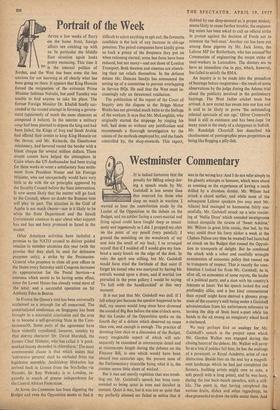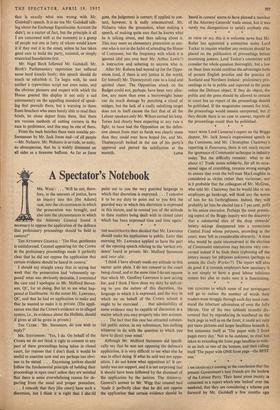Westminster Commentary
IT is indeed fortunate that the penalty for falling asleep dur- ing a speech made by Mr. Gaitskell is less severe than that reserved for those who sleep on watch in wartime. I wanted to hear the contribution made by the Leader of the Opposition to the debate on the Budget, and no soldier facing a court-martial and firing squad could have fought sleep as tenaci- ously and ingeniously as I did. I propped my chin on the point of my pencil (very painful); I ground the moulding on the woodwork of my seat into the small of my back; I so arranged myself that if I nodded off I would give my fore. head a nasty knock on the edge of the desk. In vain; the spirit was willing, but Mr. Gaitskell would have tried the fortitude of that saint (I forget his name) who was martyred by having his entrails wound upon a drum, and if martial law prevailed in the press gallery I would be saying 'To hell with the handkerchief' at this very moment.
It is not just that Mr. Gaitskell was dull. If I fell asleep just because the speaker happened to be dull, my snores would long since have drowned the sound of Big Ben before the nine o'clock news. But the Leader of the Opposition spoke on the fourth day of a debate which deserved no more than one, and enough is enough. The practice of devoting four days to a discussion of the Budget, every imaginable aspect of which will sub- sequently be examined in microscopic detail and at microscopic length during the debates on the Finance Bill, is one which would have been absurd two centuries ago; the present state of the Parliamentary timetable being what it is, the custom seems little short of wicked.
But it was not merely repletion that was troub- ling me. Mr. Gaitskell's speech has been coin- mended as being quiet in tone and detailed in content. Quiet it was, but it was not so quiet that my perfectly attuned ear failed to notice that it was in the wrong key. And I do not refer Simply to his ghastly attempts at humour, which were about as amusing as the experience of having a tooth drilled by a drunken dentist. Mr. Wilson had struck a chord earlier, and while most of the subsequent Labour speakers (we may omit Mr. Allaun) had managed to harmonise fairly suc- cessfully, Mr. Gaitskell struck up a solo render- ing of 'Nellie Dean' which sounded incongruous indeed alongside the strains of 'Sweet Adeline.' Mr. Wilson (a great little comic, that lad, by the way; could draw his forty nicker a week at the Chelsea Palace any time he wanted) had launched an attack on the Budget that roused the Opposi- tion to transports of delight. But he combined the attack with a sober and carefully wrought examination of economic policy that roused me to transports of respect. That is exactly the com- bination I looked for from Mr. Gaitskell; he is, after all, an economist of some repute, the leader of a political party, and a man with his country's interests at heart. Yet his speech lacked fire and profundity alike, and a less kind commentator than myself might have derived a gloomy prog- nosis of the country's well-being under a Gaitskell administration from his unfortunate reference to turning the ship of State hard a-port while his hands in the air swung an imaginary wheel hard a-starboard.
We may perhaps find an analogy for Mr. Gaitskell's speech in the project upon which Mr. Gordon Walker was engaged during the closing hours of the debate. Mr. Walker will never be at a loss if politics fail him; he has the makings of a pavement, or Royal Academy, artist of rare distinction. Beside him on the seat lay a magnifi- cent landscape which he had just completed (he favours, budding artists might care to note, a soft pencil with a long point), and he was busy, during the last back-bench speeches, with a still- life. The point is, that having completed the various fruits, dishes and other ingredients, he then proceeded to draw the table under them. And that is exactly what was wrong with Mr. Gaitskell's speech. It is no use Mr. Gaitskell talk- ing about the Exchange Equalisation Account (he didn't, as a matter of fact, but the principle is all I am concerned with at the moment) to a group of people not one in forty of whom would know it if they met it in the street, unless he has taken good care to build the party, national, or simply oratorical foundations first.
Mr. Nigel Birch followed Mr. Gaitskell. Mr. Birch's Parliamentary reputation has suffered some hard knocks lately; this speech should do much to refurbish it. To begin with, he used neither a typewritten script nor even notes, and the obvious pleasure and respect with which the House greeted this display is not only a sad commentary on the appalling standard of speak- ing that prevails there, but a warning to those front-benchers who seem barely able to read their briefs, let alone depart from them, that there are various methods of cutting corners in the race to preference, and this may be one of them.
From the back benches there were notable per- formances by Mr. Jack Jones and—of all people —Mr. Nabarro. Mr. Nabarro is so rude, so noisy, so obstreperous, that he is widely dismissed on all sides as a tiresome buffoon. As far as form goes, the judgement is correct; if applied to con- tent, however, it is sadly misconceived. Mr. Nabarro takes the precaution, when making a speech, of making quite sure that he knows what he is talking about, and then talking about it. This may seem an elementary precaution to any- one who is not in the habit of attending the House of Commons, but the frequency with which it is ignored (did you ever heat Mr. Arthur Lewis?) is instructive and sobering to anyone who is.
After Mr. Robens had wound up for the Oppo- sition (and, if there is any justice in the world, for himself) Mr. Thorneycroft rose to a loud and spirited cheer. The Opposition attack on the Budget could not, perhaps, have been very effec- tive, any more than even a heavyweight boxer can do much damage by punching a cloud of midges; but the lack of a really satisfying target does not in itself excuse the fact that of all the Labour speakers only Mr. Wilson earned his keep. Tories had clearly been expecting at any rate a fight; to have had the Opposition on the defen- sive almost from start to finish was clearly more than they could ever have hoped for, and Mr. Thorneycroft basked in the sun of his party's approval and purred his satisfaction at the



































 Previous page
Previous page